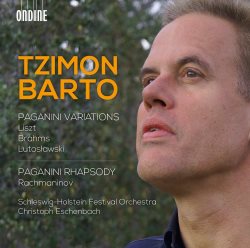| 
|
Franz LISZT (1811-1886)
Grandes Etudes de Paganini [27:39]
Johannes BRAHMS (1833-1897)
Paganini Variations [26:33]
Witold LUTOSŁAWSKI (1913-1994)
Paganini Variations [4:57]
Sergei RACHMANINOV (1873-1943)
Paganini Rhapsody [26:01]*
Tzimon Barto (piano)
Schleswig-Holstein Festival Orchestra/Christoph Eschenbach *
rec. 15-17 September 2009 (Liszt, Lutosławski); 22 March 2009 (Brahms), Onder de Linden, Valthermond, Netherlands; 16 July 2010 (Rachmaninov) Musik-und Kongresshalle Lübeck, Germany
ONDINE ODE1230 [59:21 + 26:01]
Quite why the theme from the twenty-fourth Caprice of Paganini has held such an obsessive fascination for composers utterly eludes me. I find it unremarkable and vapid, but that’s obviously my problem. That’s not to say that some composers have not done some very imaginative things with it. Tzimon Barto’s programme centres on piano works which have taken as their starting point and basis this Op. 1 theme.
He begins with Liszt’s Six Grandes Etudes de Paganini, composed in 1838 and revised thirteen years later in 1851. It is in this revised version that we tend to hear them today. Having said that, they are not as frequently programmed or as well known as the Transcendental Etudes. Each is a transcription or paraphrase of a Paganini Caprice, with the exception of no.3 La Campanella, which is taken from the finale of the Second Violin Concerto. They provide a vehicle for Barto to brandish his impressive technique. With tremolos, scale passages and double octaves these studies constitute some of the most technically difficult music in the piano repertoire. Liszt was not going to be outdone by the violinist/composer. Barto’s is a satisfying performance not only displaying pyrotechnical skill but also an understanding of the structure and architecture of the music.
In his two books of Paganini Variations, Brahms embraces the fiery virtuosity of Liszt. Barto’s infallible technique is ably suited to a work such as this. Comparing the recording with Katchen’s I found Barto’s much better paced. Katchen’s I found too fast and almost aggressive. I like the way Barto colours the variations, with deft use of pedal, exploring the sonorities of the piano. He never sounds mechanical but his playing is suffused with poetic insights, where required. Throughout he is rhythmically adept with a wide dynamic range. Technical difficulties are effortlessly overcome or so he makes it seem. I was pleased that each variation is tracked separately, which is definitely an advantage – not so with many recordings.
The Lutosławski is a work I have never heard before. It was conceived as a two-piano piece, but here Barto plays both parts using the playback method of multi-tracking. It is an accomplished tour de force, fertile, original and innovative. Showcasing Barto’s skills, at only five minutes in length, it makes a welcome addition to the pianist’s programme in all its brilliant bravado.
Rachmaninov’s Paganini Rhapsody shows imaginative and compositional flair. With brilliant orchestration, pianistically virtuosic writing, and an advanced compositional style, in comparison with his other piano concertos, this work needs a good pianist and orchestra to bring it off successfully. With spiky orchestration, I love the way Rachmaninov weaves into the score the Dies Irae as a contrast. Barto definitely meets the challenge. Eschenbach is a responsive partner and manages to inspire this wonderful orchestra to scintillating effect. With beautiful rich string sound, diaphanous woodwinds and burnished brass, the mix couldn’t be better. Also, the balance between orchestra and soloist is ideal. Most listeners to this recording, as in the concert hall, will be eagerly awaiting the ‘big tune’ of Variation 18. Barto effectively builds up the suspense and tension in the preceding two variations, but then what happens? Suddenly, for some inexplicable reason, the tempo almost grinds to a halt. I don’t doubt that the pianist loves this melody, an inversion of the Paganini theme, as many people do, but the end result is too luxuriant, self-indulgent and lingering. With an excess of rubato, the tune almost becomes a parody, and I came away feeling that a good performance had been sabotaged. A pity. I’ll stick with my Ashkenazy/LSO/Previn.
Sound quality for the solo items is second-to-none, with the Netherlands venue providing an ideal, spacious and warm acoustic. In the Paganini Rhapsody, recorded in Lübeck, Germany, the engineers have achieved an exemplary balance between piano and orchestra. The booklet contains informative notes in English and German.
Stephen Greenbank
 |
 |
|











